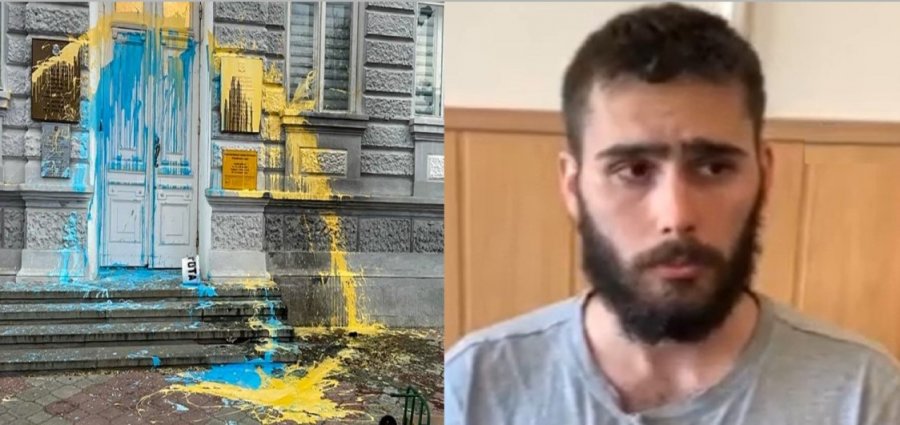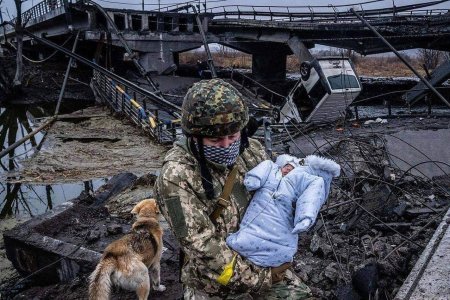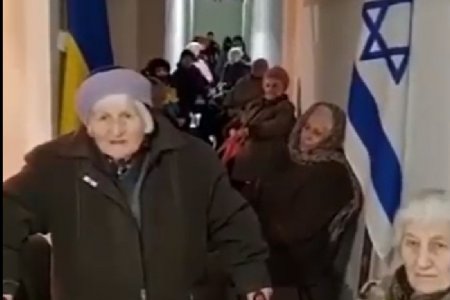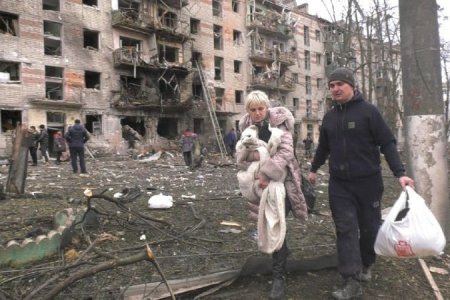
The whereabouts are unknown of Yevpatoria artist Bohdan Ziza {Azizov) who was detained for a pro-Ukrainian protest in the centre of occupied Yevpatoria on 16 May. There are grounds for concern since the 27-year-old seemed obviously distressed during a videoed ‘confession and apology’ circulated by the Russian enforcement bodies, and had very likely been beaten or otherwise coerced into making it. There is also nothing to suggest that he has been given access to an independent lawyer, and friends and human rights defenders have been unable to find out where he is being held.
Photos are available demonstrating that the administration building was indeed daubed in blue and yellow paint at the administration building in the morning of 16 May. It is somewhat less clear that Ziza actually tried to throw a Molotov cocktail at the building.
Anton Naumliuk from Graty has spoken with a friend of Ziza’s, who, for reasons that are all too obvious under Russian occupation, asked not to be named.
It seems that Ziza was not particularly active politically, however Russia’s total war against Ukraine has affected him very deeply. “In talking with him, if the war came up, the expression on Bohdan’s face instantly changed – you could see how, at a human level, all this horror was painful for him.”
Ziza had not hidden his views and had, on 23 February, as Ukrainians awaited the clearly imminent invasion, read a very strongly worded anti-war poem that he had written on his social media pages.
The friend says that Ziza did not tell anybody about his plans, and was offline from 3 a.m. the night before his protest. He was caught later, after the CCTV cameras were checked.
What actually happened then can only be surmised, however the FSB have certainly become notorious over the past eight years for the torture methods they use to obtain so-called ‘confessions’.
By the evening of 16 May, a video in which Ziza ‘confesses and apologizes’ had appeared on Kremlin-controlled media. The young man is evidently very distressed and nervous, and appears to be reciting prepared words. He states clearly that the action was in protest at Russia’s war against Ukraine, although his terminology is that pushed by the Kremlin.
“Opposing the special military operation in Ukraine carried out by the Russian Federation, I daubed the building of the Yevpatoria administration with blue and yellow paint. I also tried to carry out arson with the use of an inflammatory substance.” He goes on to “apologize before Crimeans” and to say that he is ready to face punishment.
Graty reports that a local pro-Russian blogger, Alexander Talipov posted another video. He claims that Ziza videoed his protest on his telephone and posted the video, having used a distorted voice.
The voice says the following: “A terrible war is underway, which Putin unleashed and which the state propaganda machine is trying with all its might to convince the people that this is OK. It is trying to convince them that there is no need to do anything, that they should sit silently and watch, expect that nobody can do anything. But it is very important now to go out onto the street and express your protest so that those who are against this war, those who are sitting at home and afraid to express their opinion see that they are not alone. There are a lot of us. And there are more of us than of those who support this war. However they have taken away this possibility, taken away the chance of coming out in the day, but we can come out at night. I call on everybody to come out at night onto the street and express their protest.”
The video shows a person with his face covered pouring first blue, then yellow pain on the administration building door. The door opens, with the guard shouting (more or less) “what the fuck are you doing?”. The person does not go away, but lights a Molotov cocktail and throws it at the door, before running away. The guard is no longer visible.
Talipov, who has become a vocal supporter of Russia’s aggression against Ukraine, refused to answer Graty’s legitimate question of how he had come into position of this video.
Given Ziza’s disappearance, it is probably also worth asking when the video was made and why. The paint daubing was a clear act in support of Ukraine, but hardly warranted more than a charge of vandalism, with imprisonment really only made highly likely because of the clear pro-Ukrainian message. The person on the later video risked being caught on the spot, and it is unclear why he was not. One can certainly endorse every word of the address, but it has doubtless made it significantly easier to bring serious charges against Ziza under Russia’s draconian legislation. Even before 24 February 2022, calls to come out in protest, especially if accompanied by an apparent act of arson, could get people in occupied Crimea or Russia into serious trouble.
On 4 March, just 10 days after Russian leader Vladimir Putin launched total war against Ukraine, new legislation was introduced envisaging administrative prosecution and steep fines, or even fifteen-year sentences for what were claimed to be ‘fake information’ and ‘discrediting of the Russian army’. It was clear from the outset that there were no objective guidelines for what would be considered ‘discrediting the army’ and the legislation has, as feared, been used to prosecute peaceful protest, even where this merely quoted earlier pronouncements from Putin which directly contradicted his present attempts to justify the war.
Within the first forty days of total war, 36 administrative protocols had been drawn up under the administrative article on ‘discrediting the Russian army’, with 35 of these immediately resulting in conviction, and only one sent back to the police to be worked on.



